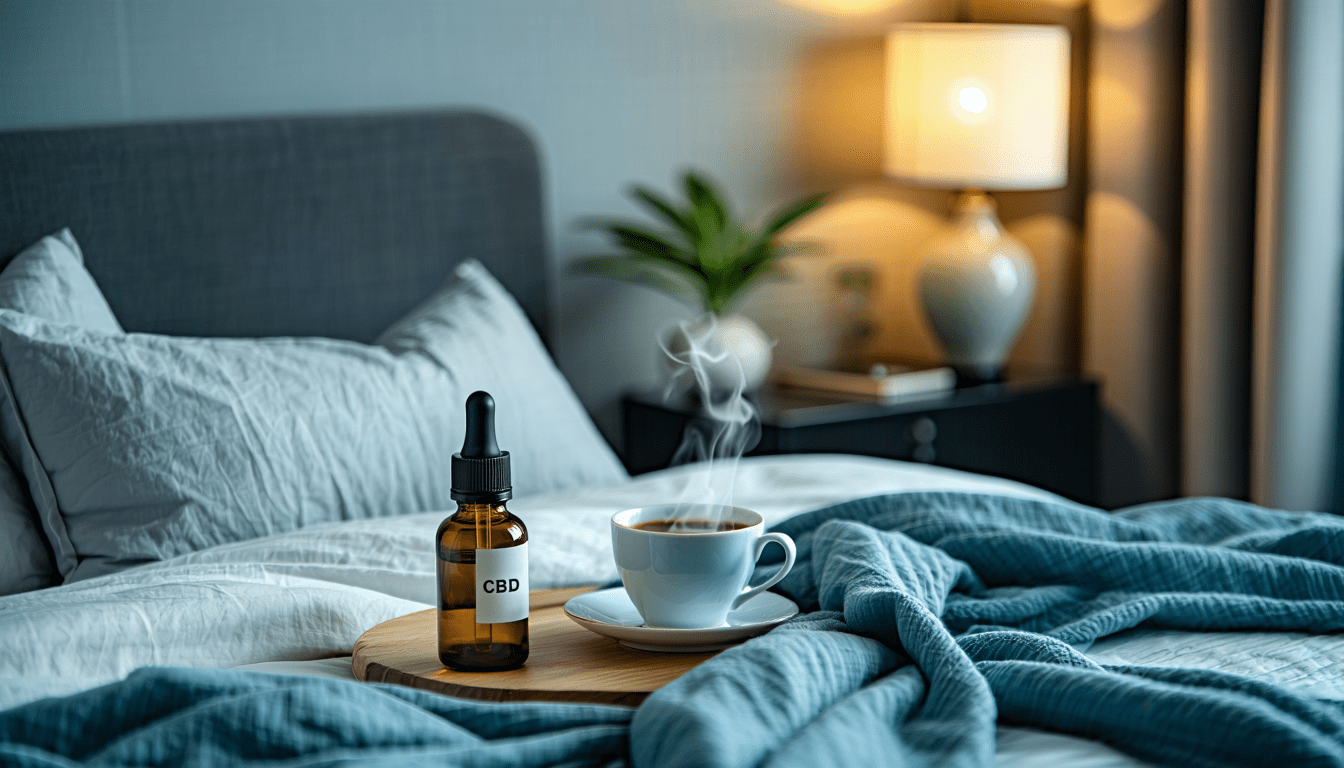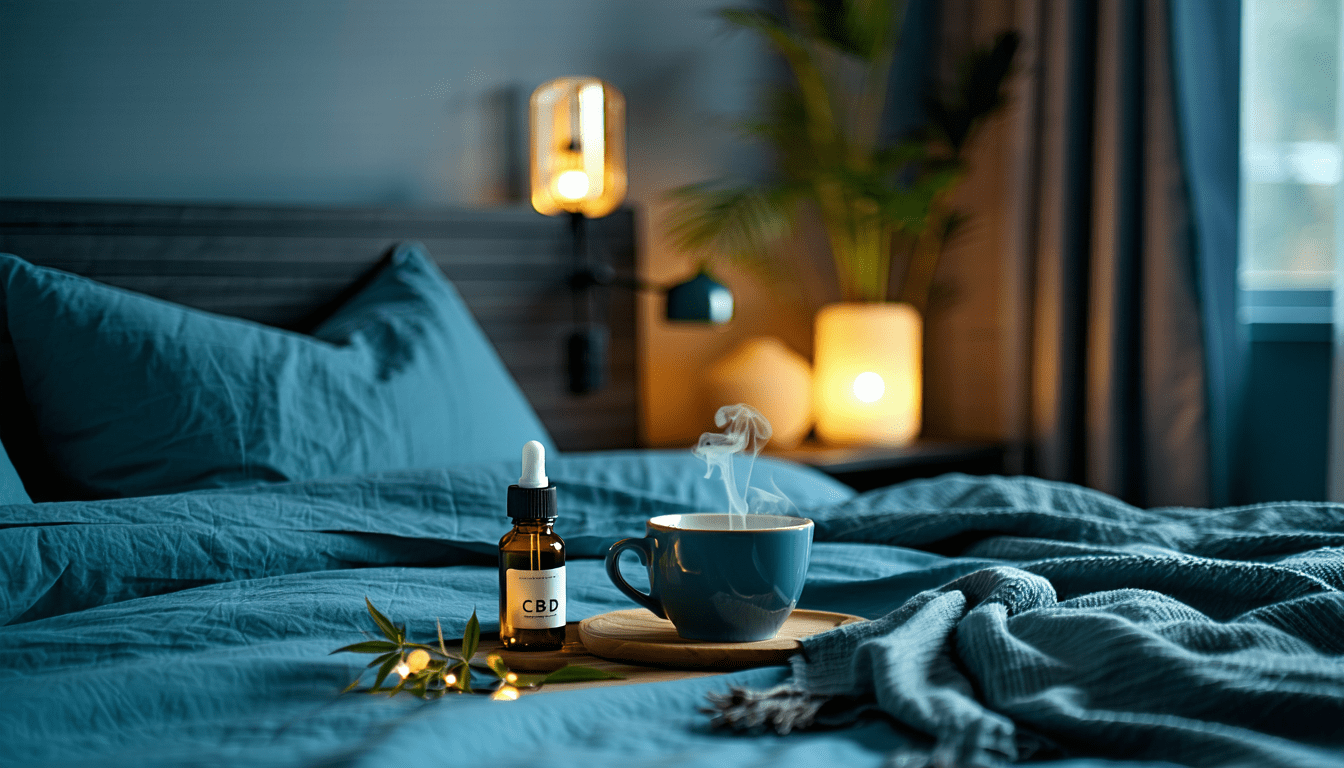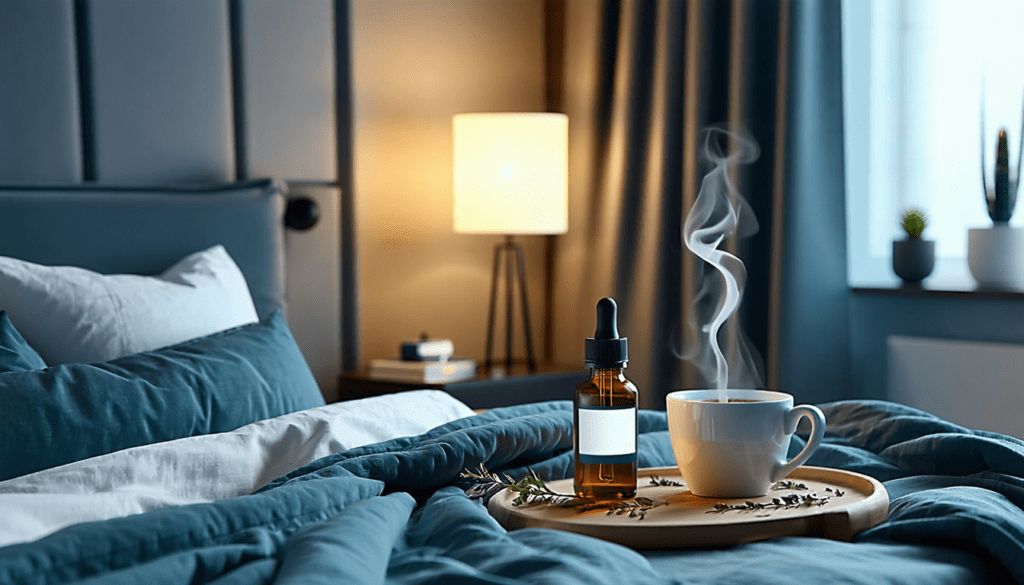|
IN BRIEF
|
As more people seek natural solutions for their sleep challenges, CBD has emerged as a potential aid in improving nightly rest. Derived from the cannabis plant, cannabidiol is known for its ability to promote relaxation and may address underlying factors such as anxiety and pain that disrupt sleep. While scientific research on its efficacy for sleep improvement is still evolving, initial findings suggest that CBD could play a significant role in assisting individuals to not only fall asleep faster but also enhance the overall quality of their rest.

As the quest for better sleep continues, many are turning to CBD as a potential solution. Research suggests that CBD may play a role in enhancing sleep quality by addressing underlying issues such as anxiety and pain that hinder relaxation. In this article, we will explore how CBD can improve your nightly rest and discuss its mechanisms, benefits, and considerations associated with its use.
Understanding How CBD Works
Cannabidiol, commonly known as CBD, is a naturally occurring compound found in the cannabis plant. Unlike THC, the psychoactive component, CBD offers potential therapeutic benefits without inducing a “high.” Studies indicate that CBD interacts with the body’s endocannabinoid system, which helps regulate various functions, including sleep, mood, and stress response.
The Role of CBD in Promoting Relaxation
One of the primary ways CBD may assist with sleep is through its ability to promote relaxation. By potentially reducing feelings of anxiety and addressing pain levels, CBD can create a more favorable environment for falling asleep. As stress, anxiety, and discomfort escalate, the body’s ability to transition into restful sleep diminishes. Therefore, alleviating these symptoms may lead to improved sleep quality.
The Impact of CBD on Sleep Disorders
Although experts are still conducting extensive studies, some research hints that CBD may be beneficial for those suffering from specific sleep disorders. A 2019 study indicated that many participants experienced enhanced sleep quality using CBD products. For individuals grappling with insomnia linked to anxiety or external stressors, CBD could serve as a natural alternative to conventional sleep aids.
Benefits of Using CBD for Sleep
Incorporating CBD into your nightly routine may yield several potential benefits. These include:
- Enhanced relaxation: By reducing anxiety and creating a calming effect, CBD may help prepare the mind and body for sleep.
- Longer sleep duration: Preliminary evidence suggests that CBD may extend the total duration of sleep, allowing for more restorative rest.
- Reduced nighttime awakenings: By mitigating discomfort or stress, CBD may lead to fewer interruptions during the night.
Dosage and Consumption Methods
When considering CBD for sleep improvement, it’s essential to understand the appropriate dosage and consumption methods. Options range from oils and tinctures to edibles like gummies. Each method may produce varying effects and onset times. It’s advisable for individuals to start with a lower dose and gradually increase it until achieving the desired effects.
Types of CBD Products
Among the many products available, broad-spectrum and full-spectrum CBD sleep gummies are particularly popular. These edible forms can be an easy and enjoyable way to introduce CBD into your bedtime routine. Understanding CBD edibles is crucial in finding the right product that fits your needs.
Considerations and Side Effects
While many people report positive experiences using CBD for sleep, it’s essential to consider potential side effects. These can range from mild drowsiness to digestive issues. Moreover, consulting with a healthcare professional before starting any CBD regimen is recommended, especially for those who are pregnant, breastfeeding, or taking other medications.
Conclusion: Is CBD Right for You?
Overall, while evidence suggests that CBD may be beneficial for improving sleep quality, more in-depth research is necessary to confirm its efficacy and safety. For anyone considering incorporating CBD into their sleep routine, it is essential to do so thoughtfully and informed by ongoing studies. To learn more about CBD and its numerous benefits, explore resources such as Exploring the Benefits of CBD for Wellness and Understanding the Benefits of CBD Gummies for Wellness.
| Aspect | Description |
| Mechanism | CBD may promote relaxation by targeting receptors that regulate stress and anxiety. |
| Benefits | Users report better sleep quality and longer durations of sleep. |
| Anxiety Relief | CBD has anti-anxiety properties that may help quiet a racing mind before bed. |
| Pain Management | Helps alleviate discomfort that may interfere with sleep for some individuals. |
| Research Status | More studies are needed to fully understand CBD’s effects on sleep. |
| Dosage | Optimal dosing varies, users may need to experiment for ideal effect. |
| Side Effects | Potential for mild side effects like drowsiness or digestive discomfort. |
| Forms Available | CBD comes in various forms such as oils, gummies, and capsules. |

As many people struggle with sleeplessness and other sleep-related issues, the search for effective solutions continues. CBD, or cannabidiol, has gained attention as a potential aid in enhancing the quality of sleep. While the body of research surrounding CBD for sleep is still emerging, there are indications that it might help alleviate conditions such as anxiety and pain, both of which can disrupt peaceful slumber.
Understanding CBD and Its Effects on Sleep
CBD is derived from the cannabis plant, but it does not produce the psychoactive effects typically associated with marijuana. Instead, it is celebrated for its therapeutic properties. Preliminary studies suggest that CBD may have a calming effect that helps individuals relax, potentially paving the way for better sleep. The precise mechanism by which CBD interacts with the body is still being explored, but its potential benefits are becoming increasingly acknowledged in wellness circles.
How CBD May Alleviate Anxiety and Pain
Stress and anxiety are notorious culprits when it comes to sleep disturbances. Research suggests that CBD may possess anti-anxiety properties, helping to reduce feelings of unease that often hinder a restful night. Additionally, many people experience pain that makes it difficult to fall asleep or stay asleep, and CBD has potential analgesic effects that may offer relief. By addressing these underlying factors, CBD might significantly improve sleep quality.
The Research Behind CBD and Sleep Improvement
While anecdotal evidence is abundant, scientific research on CBD for sleep continues to evolve. A study conducted in 2019 indicated that patients using CBD experienced improved sleep quality compared to those with disrupted sleep. Although the results are promising, it’s important to note that more rigorous studies are needed to fully understand the extent of CBD’s effects on sleep duration and overall quality.
The Role of Dosage and Product Form
One key question that often arises when considering CBD as a sleep aid is dosage. While there is no one-size-fits-all answer, individuals exploring CBD products for sleep should start with a low dose and gradually adjust based on their personal experience. Forms of CBD such as oils, gummies, or capsules each have unique benefits. For instance, CBD capsules are a convenient option for some, while others may prefer the rapid effects of an oil tincture.
Is CBD Safe for Regular Use?
As with any natural remedy, questions regarding safety and side effects are paramount. Current research indicates that CBD is generally well tolerated; however, some individuals may experience side effects such as dizziness or changes in appetite. Consulting a healthcare professional before beginning any CBD regimen, especially for sleep enhancement, is advisable. Additionally, exploring different types, such as broad-spectrum CBD or full-spectrum CBD, can help tailor the experience to one’s needs and preferences.
While the exploration of CBD for sleep is still in its infancy, the current evidence and narratives from users suggest that it holds significant potential as a sleep aid. With ongoing research, future insights may further clarify how CBD can play a pivotal role in enhancing sleep quality and overall well-being.
- Reduces Anxiety: CBD may lower anxiety levels, leading to improved relaxation.
- Eases Pain: By alleviating discomfort, CBD can help you fall asleep faster.
- Improves Sleep Duration: Some users report longer sleep duration with CBD use.
- Promotes Relaxation: CBD supports a calm state of mind conducive to sleep.
- Helps with Insomnia: CBD may address underlying issues related to sleeplessness.
- Supports Nightly Routine: Incorporating CBD into your nightly ritual may signal bedtime.
- Potentially Reduces REM Disruption: CBD may positively affect REM sleep quality.
- Variety of Forms: Available as gummies, oils, or capsules for easy consumption.
Understanding CBD and Its Role in Sleep Improvement
As sleep becomes increasingly elusive for many, individuals are turning to CBD as a potential solution for their nightly rest challenges. Cannabidiol (CBD) is often lauded for its calming effects, making it an attractive option for those struggling with insomnia or poor sleep quality. Research is still evolving, but preliminary findings suggest that CBD may help mitigate factors that contribute to sleeplessness, such as anxiety and pain, paving the way for a more restful night.
How CBD Works to Promote Relaxation
One of the primary reasons individuals try CBD for sleep is its ability to promote relaxation. CBD interacts with the body’s endocannabinoid system, which plays a crucial role in regulating mood and stress. By potentially reducing anxiety, CBD may create an environment conducive to sleep by quieting racing thoughts and providing a sense of calm. Studies have indicated that participants often report improved feelings of relaxation, which can significantly impact their ability to drift off to sleep.
Targeting Pain and Discomfort with CBD
For many, physical discomfort is a significant barrier to achieving restful sleep. Chronic pain conditions can lead to restless nights filled with tossing and turning. CBD may offer relief due to its anti-inflammatory and analgesic properties. By alleviating pain, CBD can help individuals settle into sleep more easily and stay asleep longer. This potential benefit is particularly valuable for those suffering from conditions like arthritis or migraines, where pain can frequently disrupt sleep patterns.
Potential Benefits of CBD for Sleep
In addition to targeting anxiety and pain, CBD may provide other benefits that enhance sleep quality. For instance, some research suggests that CBD can influence sleep architecture by promoting deeper sleep stages while minimizing disruption. A study found that individuals using CBD experienced more extended periods of restorative sleep, which is vital for overall health and well-being.
Dosage and Administration of CBD for Sleep
Determining the appropriate dosage of CBD is essential for reaping its sleep benefits. Each individual may respond differently based on factors such as body weight, tolerance, and the severity of sleep issues. Starting with a low dose and gradually increasing it allows users to find their optimal level for promoting sleep without adverse effects. Various products, including oils, capsules, and gummies, offer flexible options to suit different preferences.
Understanding the Safety of CBD Use
While many are enthusiastic about incorporating CBD into their nighttime routine, concerns about safety and potential side effects are well-founded. The majority of CBD users report minimal side effects, but some may experience fatigue, changes in appetite, or digestive issues. Consulting with a healthcare provider before starting CBD is a wise step, especially for individuals with pre-existing conditions or those taking medications.
Long-Term Effects and Considerations
The long-term effects of using CBD as a sleep aid remain an area ripe for exploration. As ongoing research sheds light on the potential benefits and risks of CBD for sleep, users must stay informed and cautious. While initial findings are promising, understanding one’s body’s reaction to CBD over time can help ensure it remains a beneficial part of one’s nightly regiment for improved sleep.
FAQ: CBD for Sleep
What is CBD? CBD, or Cannabidiol, is a natural compound found in the cannabis plant, often used for its potential health benefits, including its ability to promote relaxation.
How does CBD help with sleep? CBD may help improve sleep by reducing feelings of anxiety and pain, which can interfere with the ability to fall and stay asleep.
Is CBD safe to use as a sleep aid? While many people report positive results, more research is needed to fully understand the safety and effectiveness of CBD as a sleep aid.
Can CBD improve sleep quality? Some studies suggest that CBD may enhance sleep quality and duration, leading to a more restful night.
What forms of CBD are available for sleep? CBD is available in various forms, including oils, gummies, and capsules, each with its own method of consumption and absorption rate.
How much CBD should I take for sleep? The optimal dosage of CBD can vary from person to person, and it’s advisable to start with a lower dose and gradually increase it until the desired effect is achieved.
Are there any side effects of taking CBD for sleep? While CBD is generally well-tolerated, some people may experience side effects such as fatigue, diarrhea, or changes in appetite.
How long before bedtime should I take CBD? It is often recommended to take CBD about 30 to 60 minutes before bedtime to allow it to take effect.
Does CBD affect REM sleep? Research on how CBD influences REM sleep is still ongoing, and results are mixed, with some studies suggesting minimal impact.
Can CBD help with insomnia caused by anxiety or stress? Yes, for individuals whose insomnia is linked to anxiety or stress, CBD may provide relief and improve overall sleep.



